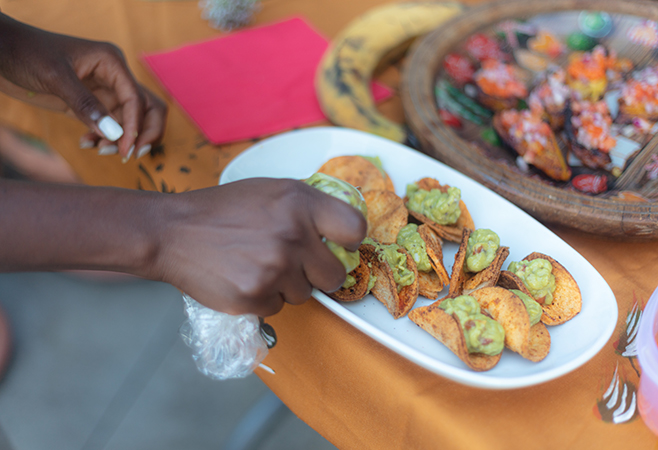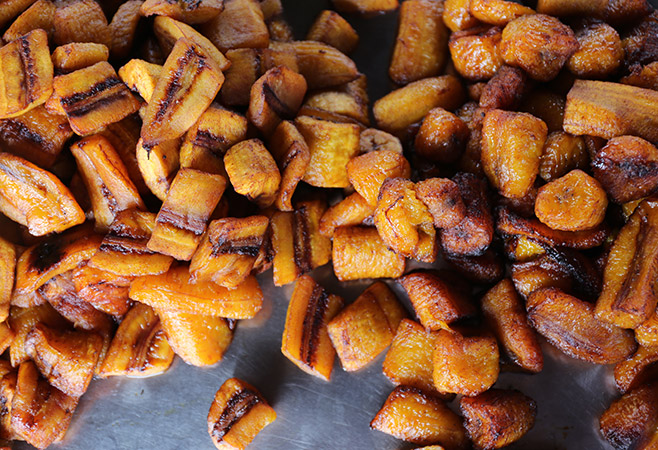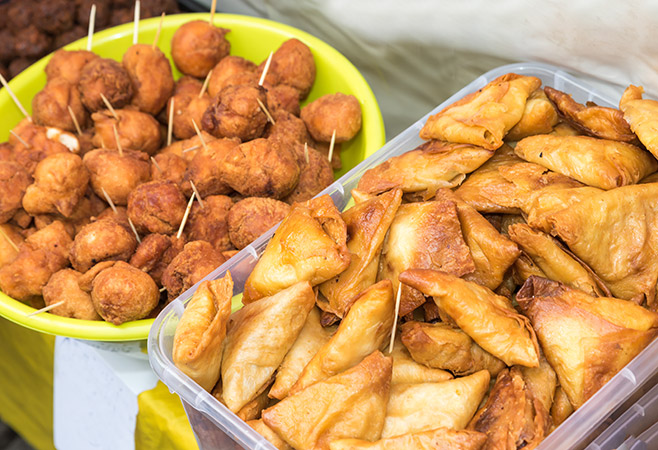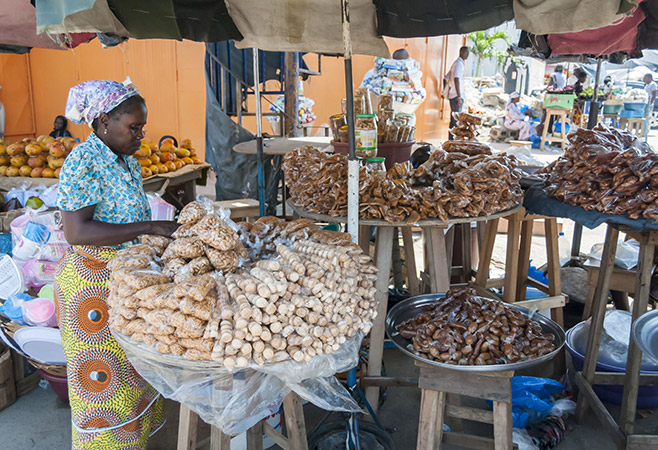Ivory Coast Desserts: Must-Try Dishes for Travelers
Ivory Coast offers a modest yet delightful array of traditional sweet snacks rather than formal ‘desserts,’ reflecting local tastes and ingredients. While dessert is not always a prominent feature in Ivorian meals, the sweet treats that are popular are flavorful, unique, and worth seeking out for an authentic taste experience.
 A delicious plate of Ivory Coast desserts
A delicious plate of Ivory Coast desserts
Popular Traditional Desserts and Sweet Snacks
1. Banana Beignets (Beignets de Banane)
One of the most beloved Ivory Coast desserts, banana beignets are deep-fried dough balls made from ripe bananas, flour, and sugar. They’re crisp on the outside and soft on the inside, with a natural sweetness that pairs perfectly with a cup of local coffee.
These treats are sold by street vendors across Abidjan, especially in markets like Marché de Treichville or Cocody Market.
2. Coconut Candy (Bonbons de Coco)
Coconut lovers will find heaven in bonbons de coco, a chewy and aromatic dessert made from grated coconut, sugar, and sometimes a splash of vanilla or lime. These candies are sun-dried or cooked until they form golden, caramelized bites.
They’re common in coastal towns such as Grand-Bassam and San Pedro, where coconuts are plentiful.
Cultural note: Coconut candy is often prepared during holidays or given as a sweet gift among friends and family.
 Popular Ivorian street desserts are prepared fresh with banana and palm sugar
Popular Ivorian street desserts are prepared fresh with banana and palm sugar
3. Cassava Cake (Gâteau de Manioc)
A must-try for travelers looking for a traditional taste of Ivorian home cooking, cassava cake combines grated cassava with butter, sugar, and coconut milk. It’s baked until golden and has a rich, moist texture — similar to a pudding cake.
This dessert showcases how Ivorians turn staple crops into delicious creations. You can find cassava cakes in local bakeries and restaurants that serve Ivorian home-style cuisine.
4. Peanut Brittle (Nougat d’Arachide)
Known locally as nougat d’arachide, this crunchy treat is made with roasted peanuts coated in caramelized sugar or honey. It’s simple but irresistibly good, and it reflects the country’s love for peanuts — a key crop across West Africa.
Street vendors often sell this snack near schools, beaches, and bus stations, making it easy for travelers to find. It’s the perfect energy boost during a day of sightseeing.
5. Fried Plantains with Sugar and Cinnamon
Plantains are a staple in Ivorian cuisine, and when they ripen, they become the star of a delightful dessert. Sliced plantains are fried until caramelized and sprinkled with sugar and cinnamon.
This comforting dish can be found in local restaurants and home kitchens alike. Some variations include adding coconut flakes or serving it with a scoop of ice cream for a modern twist.
6. Papaya Jam (Confiture de Papaye)
Papaya grows abundantly in Côte d’Ivoire, and locals transform it into a delicious jam or preserve. Confiture de papaye is often served with bread during breakfast, but can also be enjoyed as a light dessert.
Visitors staying in boutique hotels or local guesthouses might encounter homemade versions of this jam — often less sweet and more fragrant than commercial ones.
 Sweet and crispy Ivory Coast desserts that combine African and tropical culinary traditions
Sweet and crispy Ivory Coast desserts that combine African and tropical culinary traditions
7. Tropical Fruit Salads
Fresh fruits play a central role in Ivorian desserts. Markets overflow with mangoes, pineapples, papayas, coconuts, and guavas, all used to create refreshing fruit salads. These colorful bowls are perfect for travelers looking for something light, healthy, and naturally sweet.
Tip for visitors: Try fruit salads topped with a squeeze of lime or a drizzle of honey — a common local touch.
8. Sweet Attiéké with Honey or Coconut
While attiéké (fermented cassava couscous) is traditionally a savory dish, some Ivorians enjoy it as a sweet treat by adding honey, coconut flakes, and bananas. This creative variation gives travelers a unique spin on the country’s national dish.
You’ll find sweet attiéké versions in certain cafés and breakfast stalls in Abidjan.
Where to Try Ivory Coast Desserts
Travelers can experience Ivorian desserts in various settings — from street stalls to upscale restaurants. Here are a few suggestions:
- Cafés and Bakeries in Abidjan: Try Pâtisserie Abidjanaise or Chez Ambroise for baked local treats.
- Markets: Marché de Cocody and Marché de Treichville are great for street-style sweets.
- Beach Resorts in Grand-Bassam: Enjoy coconut and tropical fruit desserts with a sea view.
- Local Restaurants: Many traditional restaurants serve cassava or plantain-based desserts as part of set meals.
- Cultural Tours and Cooking Classes: Travelers can learn to prepare traditional desserts during culinary workshops or home-stay experiences.
 A street vendor preparing popular Ivorian desserts
A street vendor preparing popular Ivorian desserts
Interesting Facts about Ivory Coast Desserts
In Ivorian culture, offering something sweet symbolizes warmth and generosity. When visiting a local home, guests are often served fruit, tea, or small homemade sweets.
Desserts also appear in religious celebrations and national holidays such as Independence Day (August 7), when communities gather to share food and music.
For travelers, exploring desserts is not just about tasting — it’s a way to experience Ivorian hospitality and connection.
Travel Tips for Enjoying Ivory Coast Desserts
- Timing: Most local desserts are prepared in the morning and sold throughout the day. Visit markets before noon for the freshest items.
- Hygiene: Choose vendors with clean setups or purchase from reputable cafés.
- Allergies: Many desserts contain peanuts or coconut — ask before trying if you have allergies.
- Travelers discovering the Ivory Coast’s sweet offerings should try a variety of these treats to truly appreciate the culinary diversity. Many desserts and snack foods are best enjoyed from street vendors or local markets, where the flavors are freshest and the experience most authentic.
In summary, Ivory Coast desserts and sweet snacks form an essential part of the travel experience, distinguished by plantain, coconut, peanuts, and traditional preparations that delight the palate and offer a sweet window into the country's vibrant food culture.
Travelers are encouraged to savor these sweets to complement their exploration of the Ivory Coast’s fascinating landscapes and heritage.
Related Articles
- Traveling to Côte d’Ivoire from France: Visa & Entry Checklist
- Best Cities in Africa to Visit: Top Travel Destinations
- Best Time to Visit Africa: A Complete Guide for Every Traveler
- Ivory Coast Visa Fingerprinting Process Explained
- Ivory Coast Birdwatching: Where Are Best Spots & Species
- Top Kitesurfing Spots in Ivory Coast: Where and When
- Ivory Coast Visa and Travel Advisory Updates for Tourists
- Top African Airports Every Traveler Should Know
- Visa-Free Travel to the Ivory Coast - Things to Know
HOW CAN WE HELP?
APPLY WITH CONFIDENCE
|











